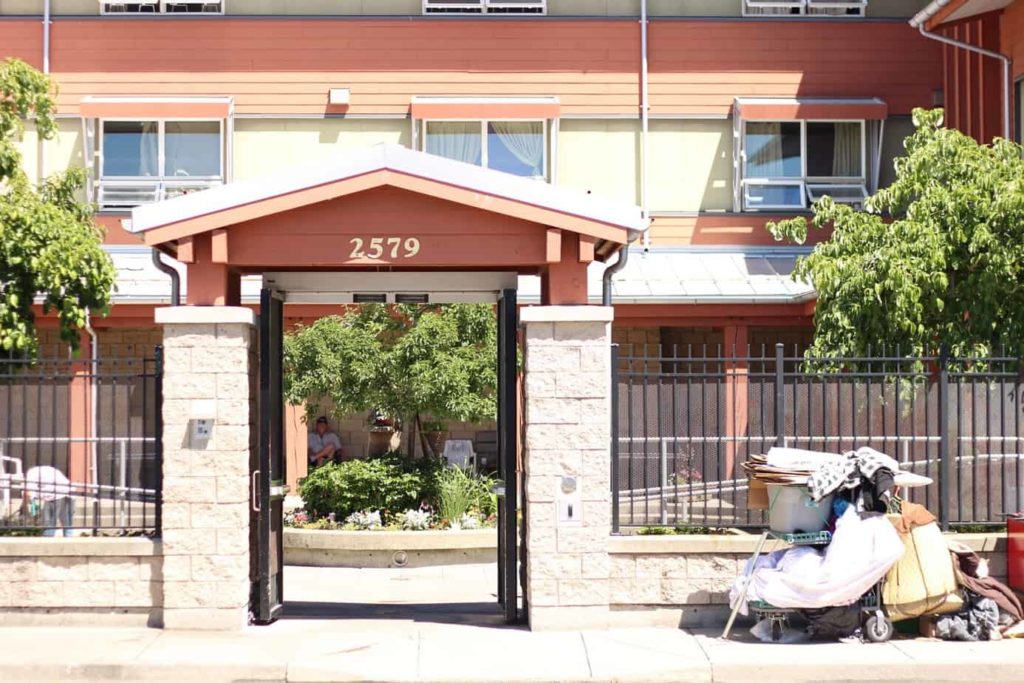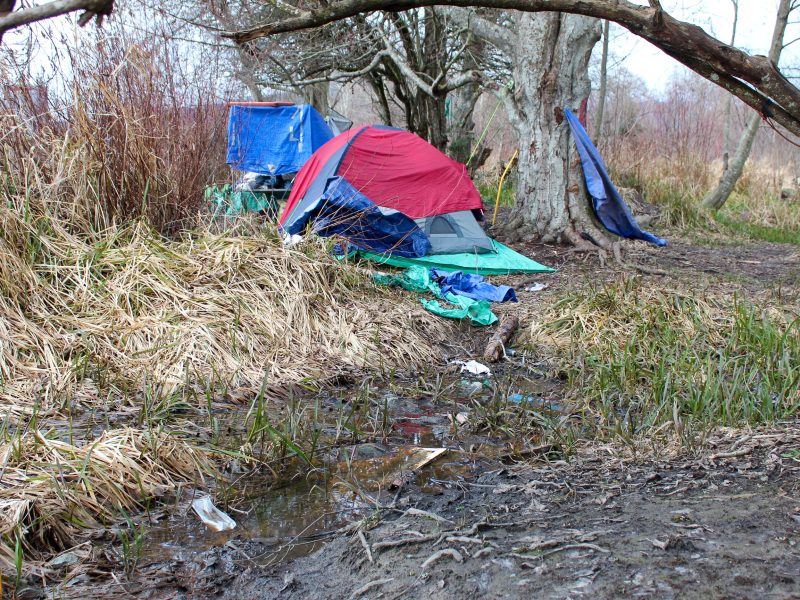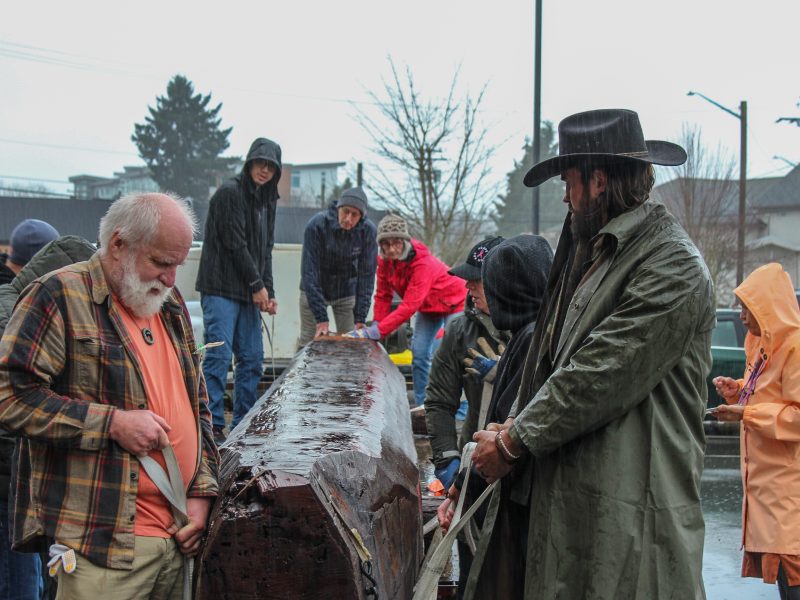
The Cowichan Valley branch of the Canadian Mental Health Association (CMHA) is taking action in response to a one-year probation imposed by the provincial CMHA after an external investigation found misconduct and mismanagement at the branch.
In conversations last week with The Discourse Cowichan, board president Cathy Schmidt and chief administrative officer Anne Brunet, who has also been serving as acting executive director since March, say they are committed to resolving the issues identified in the report.
The Cowichan Valley branch of the CMHA, founded in 1992, aims to support children, youth and adults with mental health challenges. Its programs include various counselling services, the Overdose Prevention Site, the Warmland House shelter, BikeWorks, the Open Door youth services centre, and more.
The local CMHA board received three complaints last year. One complaint alleged unfair treatment towards a tenant of CMHA’s housing program and the tenant’s advocate. One alleged unfair treatment towards a former board member. The third complaint alleged overall mismanagement. Schmidt says the board hoped calling for an independent investigation would help to gain back community trust.
What did the investigation find?
The investigation by Victoria lawyer Joanna Gislason, contracted by CMHA BC, found that “overall the Cowichan Valley Branch is doing good work delivering important services to people who need their help.” And the investigation uncovered no evidence of financial mismanagement.
However, the investigation also found misconduct by two staffers and that the branch’s housing policies and practices “undermined and interfered with a tenant’s security.” The investigation report calls for a “thorough review and redesign of the housing program” as well as improvements in governance, transparency and accountability.
The report also calls on the branch to “engage in organization-wide training focused on a meaningful commitment to Indigenous reconciliation, including training on cultural safety, humility, and trauma-informed care.”
Schmidt says the probation is appropriate and she is confident that the local branch, with the support of the provincial CMHA, will be able to implement the report’s recommendations over the next year. If these recommendations are not satisfactorily implemented, the branch risks losing its association with the CMHA.
“We want to show [CMHA BC] that we can take this and we can grow from it, and we can learn from it and we can move forward from it,” Schmidt says. “We don’t want folks to lose their services because we messed up.” The branch is looking to hire a new executive director.
An ‘authentic act’ towards reconciliation
Last week, Schmidt met with representatives of the Red Willow Womyn’s Society, the group at the centre of the complaint that CMHA staff mistreated a tenant and advocate. Red Willow is an advocacy group dedicated to supporting Indigenous families and preventing child apprehensions. The group previously had a partnership with CMHA’s transitional housing program to house families at risk of having their children apprehended for lack of appropriate housing.
Just hours after the meeting last week, the local CMHA board appointed Elder Joe Norris of the Halalt First Nation as a board member. Norris is also a board member and advisor to Red Willow.
“I firmly believe that they’re heading in the right direction to have a Native voice on the board,” Norris tells The Discourse Cowichan. He says he will bring his significant experience as a businessman in addition to a lifetime of Indigenous leadership teachings.

“Having worked with Joe for the last three years, and what he’s inspired in our tiny organization, I’m confident there’s a lot of good that can come out of this,” says Patricia Dawn, with Red Willow. “Deconstructing a colonial model isn’t going to happen overnight. But they have set that intention, and it’s awesome. Because I don’t know anyone else who is doing that.”
Dawn says that getting to this point with CMHA has been challenging, and it’s still just a beginning. “It’s a tender time, and we’re just starting to build relations.”
But, by putting an Indigenous voice in a leadership role, CMHA has made an important first step, Dawn says. “It signals a new time in the Valley, to me. It signals a turning point. And is an authentic act of decolonization and truth and reconciliation. It’s not just words.”
“Elder Norris is an amazing man,” Schmidt, the board president, says. “He’ll be able to help us greatly with our positive move forward as far as cultural connections and relations and being able to help us embed the culture into our practice.”
CHMA plans to outreach to local First Nations, as well. It’s really important that Indigenous communities have a say in rebuilding the organization’s structures, Schmidt says. “When we do this together, we move the whole community forward together.”
Redesigning the housing program
Last week, the CMHA board asked staff to pull together statistics on the clientele of the housing program and how well the program is serving them, Schmidt says. The housing program consists of 24 transitional apartments at Warmland House and 15 transitional housing units in the community.
The information will help the board ascertain what’s working well, what needs improvement and what may need to be shelved, Schmidt says. She says the branch is prepared to make major changes to the housing program to meet client needs.
Schmidt says the board wants to ensure that safeguards are in place for those who are struggling. The board also wants to ensure the program supports people to move on from transitional housing, she says. “We’re trying to make sure that they have what they need to be able to take that next step in their journeys.”
Schmidt says decisions regarding staffing of the housing program will wait until after the review.

Building a better foundation
Schmidt was appointed to the board in November 2018 and elected as board president in July 2019. She had previously served on other boards, including three terms as a Cowichan Valley School District trustee. Schmidt says that when she joined the CMHA, she recognized a need to “rebuild the root of the organization” but didn’t know how urgently it needed to be built.
This was made clear by the external investigation, which looked into a complaint filed in June 2019 by a former board member alleging “unfair treatment and a failure to engage in a respectful resolution process.” The investigation report calls for board training in governance and conflict resolution as well as the development of “clear written policies and procedures” and “clearer guidelines and structures to facilitate board oversight.”
Schmidt says that the board, whose members have all been appointed in the past year and a half, takes full responsibility for the findings of the investigation. “We already have great people [on staff], but our foundation is a little bit wobbly because of missing structure, and that’s what the board is working on right now.”
The investigation found that the branch is spending funds appropriately and properly accounting for how the money is spent. As a result, Schmidt says she doesn’t expect that the investigation will impact future funding for the branch. She met recently with two of their main funders, BC Housing and Island Health, and says that both remain supportive.
The annual budget for the local CMHA is $3.9 million. Chief administrative officer Anne Brunet says that the investigation did not find the branch to be overfunded or, with 95 employees, overstaffed.

Throwing open the doors
Brunet has been working for the CMHA for five years. She says that efforts to implement recommendations from the investigation will not impede the organization’s ability to carry out its mandate to serve people struggling with addictions and mental health.
One of Brunet’s main takeaways from the report, she says, is that the branch needs to do a much better job communicating about the services the organization provides, including its many youth programs such as BikeWorks.
“There’s a need to engage people and make sure they understand that the work we’re doing is actually improving things and it’s not sending things in the other direction,” she says. “We do care about their opinions and we do care how we fit into this community. Because we’re dealing with some serious stuff, and having people believe in the work we do is very important to us.”
Schmidt worries that being put on probation could tarnish the good work that compassionate CMHA staff are doing. She says that their work is already hard enough as it is, plus they often bear the brunt of the public’s frustration with how the opioid overdose epidemic and affordable housing crisis are playing out locally.
”I just wish instead of people slamming us in the press, they would pick up the phone or send me an email,” says Schmidt, who adds that her email address is listed on the website. She has been speaking with the board about how to provide more supports for staff.
She invites people, especially those in the neighbourhoods around the Warmland shelter and the Overdose Prevention Site, to learn more about the organization. Schmidt promises them increased transparency and accountability. She adds that the CMHA is thinking of holding a town hall in the fall or winter. “Our shutters are open and now we’re throwing open our doors.” [end]



